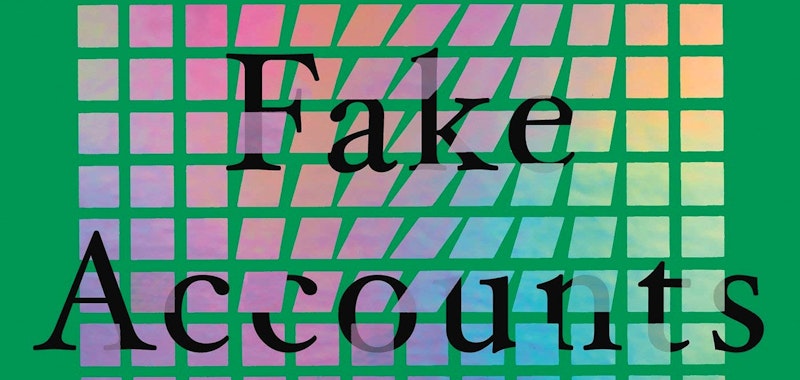Lauren Oyler’s Fake Accounts is not “auto-fiction”—at least, the events described didn’t happen to her, by any stretch of the imagination. The book is being promoted as the story of a Millennial media writer discovering that her boyfriend is a secret online conspiracy theory celebrity, with a meme account (@THIS_ACCOUNT_IS_BUGGED) with many more followers than her own, non-anonymous Twitter profile. These things do happen in Fake Accounts, but they make up such a small portion of the book that their prominence in the promotion feels like a movie trailer fake-out, or a circus act with fabulous signs and pathetic, depressing realities behind the curtain.
This isn’t the wind-up to a pan or a comparison of Oyler’s work to that of film editors (noble) or carnival workers (nobler), but I was disappointed to find another book about being an aimless and “open” Millennial in a foreign country (or New York). Most of Fake Accounts details the comings and goings of the unnamed narrator, superficially similar in description to Oyler herself but, as she insists in interviews and at the end in the book’s acknowledgments, the narrator is, in certain respects, very much not her. It’s a canny decision by someone more comfortable not only writing a novel ostensibly about online life, but whose writing has been informed by Twitter’s limitations and eccentricities.
Oyler’s a much more deft and fearless writer than, for example, Emma Cline, whose prose is stiff and affectless. She’s a traditional Iowa Writers’ Workshop artist, without any personality (besides her habit of describing things in terms of bad smells). Oyler, despite her English degree from Yale, isn’t as inhibited as certain people that’ve been published frequently in The Paris Review. She’s also a much better writer than Benjamin Nugent and Kristine Roupenian, off the top of my head, both authors with new books and more published work than Oyler. Along with the narrator of Fake Accounts, Oyler worked as a copy editor in Berlin and wrote clickbait for Broadly in the 2010s—she doesn’t have any other extant short stories.
By that account, Fake Accounts is a good first novel: it’s messy, with a couple of great bits, some very good bits, and most of all, a very specific mania associated with a very small section of Twitter users. This is where the novel loses me: it’s, as far as I can tell, a vivid rendering of what being a heavy Twitter user is like for someone working in media and in the narrator’s middle-upper-middle-class milieu. You recognize it before you read it: anxiety spirals, run-on sentences from unformed thoughts hurtling through the narrator’s head as she works out the verities and seemingly impossible to navigate modern world (as an American in Berlin). Fill in the cosmopolitan city of your choice for that last one, because that could also describe Ben Lerner’s Spain-set Leaving the Atocha Station (mentioned by name early in Fake Accounts, and dissed by the narrator).
Fake Accounts is better than Leaving the Atocha Station, because at least Oyler’s book has something new in its retelling of the tired American abroad during globalization story we’ve been hit with over and over again like a piñata for the last seven or eight years. The mania and the decision to closely link the narrator to the author in the beginning and then gradually wear that connection down as the book goes on—slides on, as the fourth wall is broken with acknowledgment about a certain way of writing with lots of paragraph breaks and indents, a bit on the nose—and it becomes obvious that this is someone who’d be a nightmare at a party or any social situation. She’s a parasite, and early in her stay in Berlin, she mentions that she’d rather spend time with people she doesn’t like than eat Vietnamese food alone—that I can’t relate to.
Rob Doyle in The Guardian: “The boyfriend’s second life is a MacGuffin that allows Oyler’s narrator to expatiate on her true theme: the amount of time she spends on her phone, and how bad this makes her feel.” It’s a bait-and-switch, and Oyler’s “true theme,” if Doyle is correct, is banal and hardly new. As far as unreliable and narcissistic female protagonists go, every direction that Oyler’s narrator points in was already taken much further by Ottessa Moshfegh in her previous three books. I can’t find it for the life of me, but I saw a tweet last week that called Fake Accounts “the best book ever written about the Internet,” which can only be true if you use the Internet in this very specific and limited way.
Because Fake Accounts never delves into the messy and dark realities of the “dark web” implied by the promo, the overall impression is of a book half-cocked, and its admittedly funny experiments toward the middle are still overshadowed by a nagging sense that this book hasn’t really started yet. The boyfriend, turns out, faked his death: he tells the narrator that making her find out for herself “was part of the point.” By ending the novel on these words, Oyler tries to reframe it as a sort of pathetic modern “hero’s journey,” but the narrator hardly does anything and hardly anything happens to her in these 263 pages. How many “fake accounts” are even mentioned besides the boyfriend’s multiple handles? Just one: “@HelenOfTroyWI.” I wonder who that could be?
—Follow Nicky Smith on Twitter: @nickyotissmith

